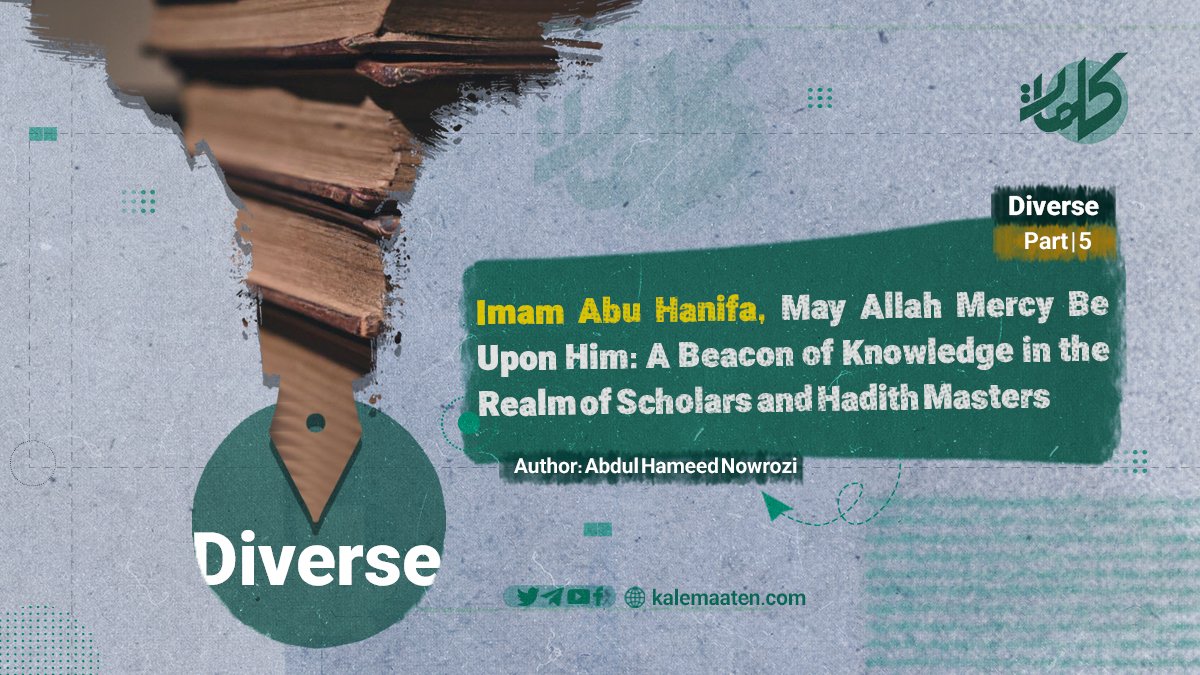
Author: Abdul Hameed Nowrozi
Imam Abu Hanifa, May Allah Mercy Be Upon Him: A Beacon of Knowledge in the Realm of Scholars and Hadith Masters (Part Five)
Worship of Imam Abu Hanifah, May Allah Have Mercy on Him
One of the poets has said, “How good it is that religion and the world come together!” Imam Abu Hanifah, may Allah have mercy on him, was a man who not only brought religion, and the world together but also unified three things that added to his stature: wealth, knowledge, and jurisprudence; worship and piety.
Indeed, how beautiful it is that speech and deeds relate to each other, and that the scholar acts according to his knowledge, and the jurist implements the rulings of his jurisprudence before others. The imam and leader should set an example for those around him in worship and perseverance, surpassing them in piety. Imam Abu Hanifah, may Allah have mercy on him, was one of these examples; someone who acted according to his knowledge of religion and jurisprudence and advanced it vigorously. He avoided sins because he recognized their evilness through his intellect, heart, and faith. Therefore, he said, “I used to consider sin as vile; thus, I abandoned them out of virtue and bravery, and as a result, this act transformed into religiosity.” He followed this warning against sins by striving to get closer to Allah and by being obedient. He worshiped extensively, sleeping only a little at night, to the extent that he was called “the nail of the night” because he prayed so much at night. He would cry during Tahajjud, and his neighbors could hear him weeping, their hearts burning with his sadness. He remained vigilant in prayer and recitation, and it is said that he performed the morning prayer for forty years with the wudu (ablution) of the Isha (Night) prayer.
Regardless of whether these anecdotes are exaggerated, they nonetheless convey that Abu Hanifah, may Allah have mercy on him, was a man of worship and piety, in addition to being a scholar and jurist.
Imam Abu Hanifah, may Allah have mercy on him, loved to repeat a verse of the Qur’an dozens of times during Tahajjud, presenting it to his mind and heart. He would repeat a verse, reflect on it, and be profoundly affected by it. As much as he repeated and contemplated, his understanding deepened, leading to new insights and a growing influence upon him.
What is clear in the life of Imam Abu Hanifah, may Allah have mercy on him, is the high regard he held for the Holy Qur’an. He recited and sought to understand the Qur’an extensively; he repeated its verses in his prayers, reflecting upon them and being influenced by them. He relied on the Holy Qur’an more than anything else in seeking guidance and deriving rulings; he looked to it for reasons and proofs in his debates and discussions, and he was zealous in preserving, publishing, and disseminating the Qur’an. It is said that Hamad, the son of Imam Abu Hanifah, may Allah have mercy on him, was a young child whom his father sent to memorize the Qur’an. When Hamad’s teacher succeeded in helping him memorize Surah Al-Fatiha, Imam Abu Hanifah was very pleased and sent five hundred dirhams to his teacher, which surprised him. The teacher wondered, “What have I done to deserve this amount?!” Imam Abu Hanifah, may Allah have mercy on him, was informed about the teacher’s reaction and summoned him, saying, “Do not belittle what you have taught and imparted to my son. I swear by Allah, if I had more than this, I would have given it to you out of respect for the Qur’an.”
Asceticism and Piety of Imam Abu Hanifah, May Allah Have Mercy on Him
Once, a sheep was lost in Kufa. Imam Abu Hanifah refrained from eating sheep meat and inquired how long a sheep can live at most. It was said, “Seven years.” So, he stopped eating sheep meat for seven years, to ensure that the meat of this potentially forbidden sheep would not reach him, as he did not want to wrong his heart by consuming unlawful food.
Continues…


